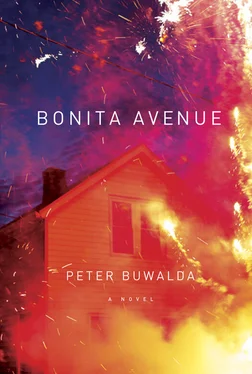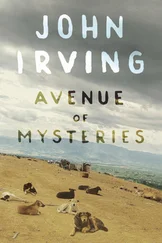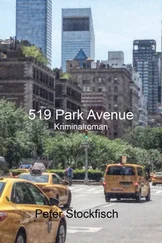Behind the desk was an open cupboard holding about 100 black cardboard dossiers, with the year — ranging from the mid-’60s until 1991—handwritten on the spine. It smelled like death in here. I wasn’t completely comfortable with this setup, I expected a hairy paw at any moment to grab my neck and force me to bend over that desk. So I asked the asthmatic Sotomayor, who stood panting behind me, if his secretary had the day off. “Here, Miss Sigerius”—his high-pitched voice took on an emotional warble—“in this very room, this cherished chamber, my dear father once worked. My late father was the founder and first director of our company.” But even with this holdup I finished with Sotomayor surprisingly quickly, and after reporting back to Rusty I treated myself to a London broil in the steak house next to my hotel. It was so quiet all I could hear was the grinding of my own molars. I got the uneasy suspicion that Aaron was already on his way. Could be, of course. That he got it into his head to book a flight. When I flew back to L.A. the next morning I seriously considered the possibility that I’d find him standing on my doorstep with outstretched arms. But I found my house as quiet as I’d left it.
I had to be off again straightaway. For the past year or so I had been Rollerblading with a group of about forty people every Tuesday evening through Santa Monica, often into West Hollywood or downtown L.A. Relaxing outings which required just enough concentration that for the entire evening I felt completely at one with the warm air flowing through my hair and the purring asphalt under my wheels. The ever-growing club met at the Pacific Coast Highway, just beyond the pier across from Seaside Terrace, a little more than half a mile from my house.
I buttered a bagel and carried my Rollerblades to the elevator that would take me down to street level. I skated the first few meters between the imposing pillars that supported most of my house, hummed around Sunset’s curves toward Ocean Drive, but instead of liberation I felt a nervous kind of melancholy. Aaron was troubling me. Twice I was passed by oncoming taxis, and twice I saw him sitting in the passenger’s seat. I turned onto the coastal road, crossed a busy line of traffic, and skated with measured glides toward the pier.
But I had second thoughts once I got a glimpse of the raucous group off in the distance. I just couldn’t face it. With a sharp turn I skated up onto the pier, took off my Rollerblades and socks and strolled among the throngs of tourists. My gaze focused on the warm, knotty planks; I walked past the seafood stalls and Pacific Park’s neon-lit Ferris wheel. The slamming of the waves against the piles under my feet. At the end of the pier, a couple of hundred yards into the ocean, I spent the next half hour staring out onto the glistening expanse, and then headed home.
I had to laugh at my own paranoia: a new message from Aaron. His tone was agitated. “I won’t be coming any time soon,” he wrote. “Berkeley is probably a bad idea anyway. You probably went there with Stol. Am I right?”
Bo and I had been living in San Francisco for a while when, one Saturday morning, we strapped Mike into the backseat of the Land Rover and drove across the Bay Bridge over to Berkeley. Mike was screaming blue murder so we made a short stop on Treasure Island, a man-made island halfway across the bay, and wondered over a cup of coffee whether we should just turn around. “Is this a good idea?” Boudewijn asked. “All those memories.” “No,” I answered, “but it’s also stupid not to go. It’s a stone’s throw. It would be ridiculous not to.”
We continued along I-80 through Oakland, through rundown Oakland, I noticed, and drove down University Avenue to the entrance gate at the west edge of the UC Berkeley campus. We parked the Land Rover and Bo put the drowsing Mike in the baby sling. We walked onto the campus past drumming students in Bears sweatshirts. Boudewijn asked what was going on: didn’t we know? — in a couple of hours the Berkeley football team was playing UCLA, you guys need some tickets? — but our goal was farther along. Evans Hall, the cube-shaped Mathematics Department where my father had cooped himself up with his knots for those two eternal years. I recognized the gravel paths, the white neoclassical academic buildings that had survived twenty years of seismic stir. Students sat under enormous oak and willow trees, chatting and laughing like actors in a campus soap. Bo, who in his redvelour hip pants and herringbone jacket looked like a well-heeled alumnus, seemed impressed by the pastoral beauty. We crossed a six-sided court planted with a matrix of pollard willows, on which he figured Nobel Prizes grew, walked around a trimmed lawn and suddenly found ourselves in front of the hideous Evans Hall. As though it were yesterday, I pushed open the brown steel and reinforced-glass door and led Boudewijn and Mike to a wood-paneled elevator that took us up to the tenth and top floor. I automatically turned left and walked down the oatmeal-colored linoleum to the small office where my father worked.
“Go ahead and knock,” Boudewijn said when he saw me hesitate in front of the door. The next room, a classroom, was open; you could see whiteboards and lecterns and the open air. “Or we could just have a look in here,” I suggested, but Boudewijn said: “Knock.”
No one answered. I turned the door handle downward and pushed, but the room once inhabited by Dr. S. Sigerius was locked up tight.
“And now?” Boudewijn had strapped Mike in and started the car.
“Just drive.”
I directed him to Telegraph Avenue, after which we followed Bancroft back toward the bay, so we could swing by Berkwood Hedge, the small elementary school with the waxed floors where Janis and I walked, hand in hand, every weekday morning for two years. Here, too, typical Californian streets, every house different from the others, Cedar Street undulating like a gray belt toward the bay, the glistening vanishing point of every perspective here. The intersections we crossed, with their just-for-show traffic lights, brought me inexorably back to 1982, and suddenly I saw the school building, damn, there it was, a stuccoed thing with a blacktop playground out in front.
“You want me to stop?” Boudewijn asked.
A classroom full of American know-it-alls, sharp as tacks and not particularly nice. Back in Utrecht, six months before I parachuted into their midst, I knelt in front of the record player as it cranked out the red Beatles double LP and looked up “Love Me Do” word for word in an English dictionary. That was the extent of my English. But I just pretended I understood. A yes here, a no there, mustn’t let them get me down, and if they managed to get Janis down I cheered her up all the way back to Bonita Avenue. Buck up. Don’t cry. What will Mom and Dad think?
“Turn left here,” I said to Boudewijn, “we’re getting close to our old house.”
A few blocks northward on the busy Martin Luther King Way, a jog right and left, and we drove onto Bonita Avenue, a quiet street with telephone poles and neatly parked family cars and lush, full trees. Siem said he’d picked this street especially because I thought “Bonita” was such a nifty word. I wrote the address at the front of the Enid Blyton book I’d brought with me from Utrecht. Joni Sigerius, 1908 Bonita Ave., Oakland, CA, USA, World, Universe. Maybe because the trees in the yards and along the sidewalks had grown since then, greener, fuller — but after a short delay I realized that everything else seemed smaller. What a crummy little street. The Land Rover crept along the spotty asphalt. With my hand resting on the warm roof I peered at the passing wooden houses.
God, there it was. The shingled house appeared from behind an overgrown hedge and an olive tree, the two small dormer windows peeking like eyes out of the pitched roof. As a kid I always thought the front of the clapboard house resembled a surprised face, and now I saw it again. That foolish expression was partly because of the front door, a gaping mouth exactly centered under a tar-paper-covered overhang. The soft bang of the wood as the door closed behind him when he got back from the university at night, suddenly standing there in the living room, boom, his leather briefcase hitting the floor, two firm kisses on my mother’s mouth. “Hello girls, I’m home!”
Читать дальше












